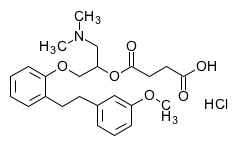serotonin

Serotonin, also known as 5-hydroxytryptamine (5HT), is an aromatic amine derived from the amino acid tryptophan, and found in serum and other tissues, which affects the diameter of blood vessels and also functions as a neurotransmitter.
Serotonin is released by mast cells, basophils, and platelets, and acts as a mediator of inflammation and allergic reactions (see allergy). It plays an important role in blood clotting, stimulating a strong heart beat, initiating sleep, fighting depression (prescription drugs that treat depression raise the brain's levels of serotonin), and causing migraine headaches in susceptible individuals (because of its ability to constrict blood vessels or cause them to spasm). In the digestive tract, serotonin inhibits gastric secretion and stimulates smooth muscle in the intestine wall.
Serotonin agonists
Serotonin agonists are a group of drugs, also known as 5HT1 agonists, used to treat acute attacks of migraine (caused by dilation of blood vessels in the brain). They act on the same receptors in the brain as serotonin, returning the dilated vessels to their normal size and so relieving symptoms. Common serotonin agonists include naratriptan and sumatriptan. These drugs can cause chest pain, particularly in people with heart disease, and should be used with caution in those at risk of coronary artery disease. Other side effects include flushing, tingling, and nausea.
Serotonin antagonists
Serotonin antagonists are a group of drugs, also known as 5HT3 antagonists, used to treat nausea and vomiting caused by radiotherapy and anticancer drugs or following general anesthesia. Symptoms occur when serotonin stimulates the vomiting center in the brain; the drugs inhibit the action of serotonin. Common examples of serotonin antagonists are granisetron and ondansetron.


